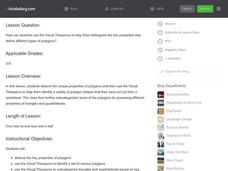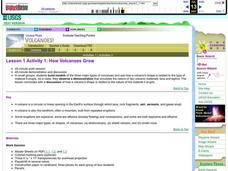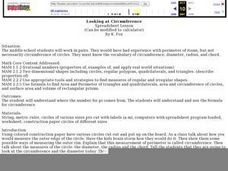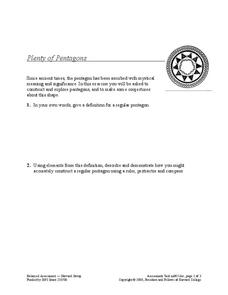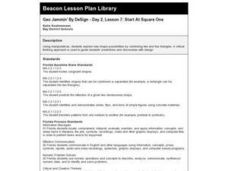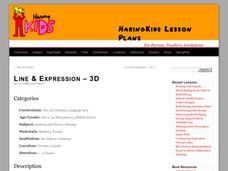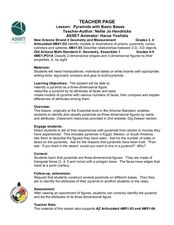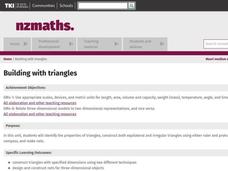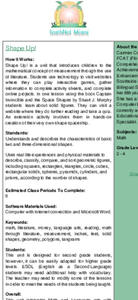Curated OER
A Rectangular Prism and Its Net
Identify the nets for prisms and other geometric shapes. Learners calculate the surface area of the rectangular prism then sketch the shapes of prisms and other polygons. Unfolded cereal boxes are used as a visual aid, great idea!
Curated OER
Shaping Up!
Kindergartners are introduced to basic shapes. Learners spend 45 minutes a day in geometry centers carrying out the activities outlined in this ambitious plan. There are games, hands-on activities, interactive websites, art projects,...
Curated OER
Ruler and Compass Constructions
Fourth and fifth graders examine how to construct perpendicular lines and to bisect angles using rulers and compasses in this unit of lessons. They design a number of polygons using these methods.
Curated OER
Know Your Polygons!
Students identify and categorize different polygons. In this polygons lesson plan, students research and identify properties of polygons, identify different polygon shapes, and categorize different triangles and quadrilaterals.
Curated OER
Finding the Area and Perimeter of Polygons
Seventh graders practice finding the area and perimeter of polygons. In this polygon area lesson, 7th graders brainstorm shapes and take a walk to locate shapes. Students record properties of shapes and use various shapes to make a...
Curated OER
Area and Volume
Use this geometry review worksheet to have learners complete nine problems involving transformations, area, volume, and unit conversions. They answer one multiple choice question on estimating lengths.
Curated OER
Countdown Challenge: Platonic Solids - Part I
Use a Platonic solids worksheet to record the number of faces, edges, and vertices of five polyhedra whose faces, edges, and vertices are all identical. For each figure, learners write a proof of Euler's formula (F+V=E+2). They create a...
Virginia Department of Education
Surface Area and Volume
Partners use materials to wrap three-dimensional objects to determine the formula for surface area. The groups use an orange to calculate the amount of peel it takes to completely cover the fruit. Using manipulatives, individuals then...
EngageNY
Truncated Cones
Learners examine objects and find their volumes using geometric formulas in the 21st installment of this 25-part module. Objects take the shape of truncated cones and pyramids, and individuals apply concepts of similar triangles to find...
Curated OER
Volume of Solids: Algebra/Geometry Institute
Use this volume of solids lesson to have learners find the surface area and volume of cylinders, pyramids, and prisms. They place cubes inside three-dimensional figures to determine the volume. Worksheets and answers are provided.
Curated OER
How Volcanoes Grow
Students build models of the three major types of volcanoes and see how a volcano's shape is related to the type of material it erupts. As a class, they observe a demonstration that simulates the nature of two volcanic materials: lava...
Curated OER
Looking at Circumference
Young scholars understand where the number for pi comes from. They understand and use the formula for circumference. Students measure the circles given out and the diameters of those circles and record the results on their worksheet.
Balanced Assessment
Plenty of Pentagons
Why are only four colors needed to color webs from regular pentagons, not five? An assessment task requires young mathematicians to first construct regular pentagons using a compass and straightedge, then has them consider a shape...
K-5 Math Teaching Resources
Dot Paper
In need of some dot paper for your next geometry lesson? Then look no further. This simple template allows you to maintain a classroom supply of this special paper for whenever the need arises.
Curated OER
The Art of Illustrator Eric Carle
First graders use two-dimensional and three-dimensional media and techniques to communicate ideas, experiences, and stories in works of art. They use media and tools in a safe and responsible manner
Curated OER
Geo Jammin' By DeSign - Day 2, Lesson 7: Start At Square One
Students examine new shape possibilities by combining two and four triangles using manipulatives.
Curated OER
Symbols to Sculptures
Learners take a 2 dimensional drawing and make it into a 3 dimensional form. For this art lesson plan, students base their work off of Keith Haring, and view slides and a video of other 3D art.
Curated OER
Line and Expression - 3D
Students watch a video and slides to view Keith Haring's work of 3 dimensional forms based on 2 dimensional imagery. In this 3 dimensional forms lesson plan, students analyze symbols and discuss lines, sound, movement, and emotions.
Curated OER
Pyramids with Basic Bases
Students explore pyramids. In this math lesson, students discuss where they have seen examples of pyramids. Students classify pyramids as three-dimensional figures and identify their attributes.
Curated OER
Building With Triangles
Fourth graders use two different techniques to construct triangles with specific dimensions. They determine how to construct nets for three-dimensional objects focusing on those made with equilateral triangles. They are able to name the...
Curated OER
What a SHAPEly Fit!
Students identify and explore the attributes of polygons. They design and create a quilt square using polygons, and produce a class quilt.
Curated OER
Make a Box
Young scholars use specific dimensions to create a box. In this geometry lesson plan, students analyze the different properties of two and three dimensional shapes. They make conjectures and use it to solve problems.
Curated OER
Shape Up!
Students investigate measurement through the use of literature through this series of lessons.
Curated OER
Grandfather Tang's Story
Students recognize, describe, and perform transformations (rotation/turn, reflection/flip, and translation/slide) on two dimensional shapes.



